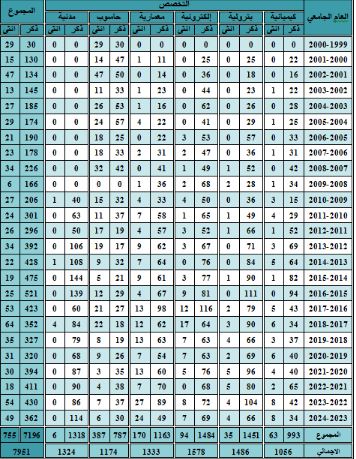Students and Graduates:
Engineering and Petroleum Faculty currently enrolls over two thousand male and female students across various academic levels. Since its establishment, the faculty has graduated a significant number of students, many of whom have successfully entered the job market both domestically and internationally.
As of the academic year 2023–2024, the total number of graduates from the faculty has exceeded 8,000 students.
The following table provides a summary of the total number of graduates from Engineering and Petroleum Faculty from its inception until the academic year 2023–2024

Academic Year:
The academic year begins in September each year, and the study period extends for 32 weeks annually, with 16 weeks allocated to each semester.
Student Registration:
- A student is considered officially registered at the Faculty upon submitting the required documents in accordance with the admission criteria and paying the prescribed fees. The student is then issued a registration number.
- The student must renew their registration within the specified period at the beginning of each academic year; otherwise, they will be considered unregistered.
- • An accepted student is issued an identification card bearing their registration number, name, major, and personal photo.
All students must carry their ID cards on campus and during examinations and present them upon request by authorized personnel. The card must be returned upon graduation or withdrawal from the university.
Withdrawal:
A student has the right to withdraw from the college under the following conditions:
- The student or an officially authorized representative must submit a withdrawal request to the Dean.
- The student must settle all financial and material obligations to the university and obtain clearance from relevant departments using the designated form.
- A withdrawing student is not entitled to a refund of any paid fees.
- The student will be given back their original documents submitted upon admission.
- A transcript of completed courses will be issued, indicating the student’s withdrawal status.
Penalties:
Students must pay their tuition fees within the deadlines set by the university. Late payments will incur financial penalties in addition to the original fees.
Attendance and Absence:
- Attending lectures for each course is mandatory.
- Absences are counted from the first day of the semester.
- A student is barred from the final exam if their attendance falls below 75% of lectures and practical sessions for any course and is considered to have failed that course.
- The Dean may accept a valid excuse for missing an exam if supported by official or medically certified documentation.
- A student who misses an exam with an accepted excuse but does not attend the make-up exam will be considered to have failed the course and will not retain their coursework grades.
Failure:
A student is considered to have failed a course in the following cases:
- Absence exceeding 25% of lectures and practical sessions.
- Scoring less than 50% in the total of coursework and final exam in theoretical courses (except in the Faculty of Medicine, where the minimum is 65%).
- Scoring less than 35% in the practical component.
- Missing the final exam without a valid excuse.
Repeating the Year:
A student may advance to the next level with a maximum of three failed courses; otherwise, they must repeat the year.
Academic Performance During Repetition:
- The student must retake failed courses, attend lectures, and sit for all assessments; otherwise, they will be marked absent.
- The student will be awarded the actual grade earned in the repeated course.
Any changes to the academic curriculum will apply to repeating students starting from the level they are repeating.
Dismissal from the University:
A student may be dismissed in the following cases:
- If their admission does not comply with general admission regulations or if required documents are missing.
- If it is discovered post-transfer that the student was previously dismissed for disciplinary reasons.
- If the student is absent for more than 50% of the first-year courses without a valid excuse.
- If the student remains in the same academic level for more than two years.
- If the student exceeds the maximum allowed study period (standard duration plus half), unless granted an extension by the University Council.
- If the student fails to reactivate their enrollment after a suspension exceeding one academic year.
- If the student is caught cheating more than once in the same exam session.
- If a disciplinary decision is issued for dismissal.
Transfer and Change of Enrollment:
Transfers are governed by the university’s official guidelines:
- The student must meet the faculty’s requirements, including available seats and selection criteria.
- A student may transfer between majors within the same faculty only once.
- The receiving department will evaluate the student’s academic record and determine which courses are transferable.
- If the student is required to complete more than four courses after evaluation, they may not advance to the next level.
- First-year students may not transfer until they complete the first academic level.
- The student’s admission type must match the system of the original major.
Enrollment Suspension:
A student may temporarily suspend their enrollment under the following conditions:
- Submit a suspension request to the Dean at least two weeks before final exams.
- Provide a valid justification for the suspension.
- Suspension is not allowed in the first academic level or for transferred students unless they have completed at least one successful semester (exceptions may be considered).
- International students may not suspend enrollment if prohibited by scholarship or admission regulations.
- Students repeating a level may not suspend enrollment.
- The maximum suspension period is two academic years (four semesters), whether consecutive or not.
- A student must request reactivation within three weeks of the start of the next semester; otherwise, they will be considered absent without excuse.
Suspension does not exempt the student from any prior financial obligations but preserves their academic standing. The suspension period is not counted toward the maximum study duration.
Appeals:
- Students may appeal exam results within two weeks of the result announcement to review their answer sheets and grade calculations.
- A refundable fee is required for the appeal, subject to confirmation of its validity.
- Appeal results must be announced within one month of the original result.
Grade Improvement:
To improve academic standing, the following may be applied:
- An additional 2% may be added to a course grade if needed to pass.
- An additional 1% may be added to improve the course grade.
- An additional 10% may be added to a single course if it is the only one preventing graduation.
These added points do not count toward the cumulative GPA.
Honors Distinction:
A student is awarded honors upon graduation if:
- They achieved at least a “Very Good” grade in all academic levels and did not receive a “Pass” in any major course.
- They did not fail or get barred from any course during their study.
- They completed graduation requirements within the minimum study period, excluding justified absences or suspensions.
Supplementary Exams:
- A student may sit for supplementary exams if they fail in 50% or fewer of their current level courses.
- Students failing in more than 50% must repeat the year.
- Students with failed courses from previous years may only retake them during the supplementary exam period at the end of the academic year.
Students from levels two to five may carry up to three failed courses to the next level. First-year students carrying more than three failed courses will be dismissed from the faculty.
Student Rights and Disciplinary Regulations
All students enrolled at the university, regardless of their academic level, are subject to the disciplinary rules and regulations outlined in this system.
Acquiring knowledge and education is the foremost and fundamental right of every student. Accompanying this are several rights that distinguish university students from others, including but not limited to:
- a. The right to express opinions and actively participate in the university’s academic programs, curriculum planning, and performance evaluation in accordance with academic, scientific, and administrative standards.
- b. The right to obtain a university ID card, which serves as official identification on campus.
- c. The right to be honored if eligible, including having their name displayed on the university’s honor board, as per the regulations.
- d. The right to join and contribute to scientific associations and participate in their activities in accordance with relevant regulations.
- e. The right to use university libraries and laboratories for research, borrowing, and academic development, in accordance with established rules.
- f. The right to participate in university-sponsored activities such as sports, cultural, and social events.
- g. The right to receive primary healthcare and social support on campus, including access to academic advisors and social workers, and to request financial aid as per university regulations.
- h. The right to appeal or request a review of decisions made against them, in accordance with this system.
- i. The right to receive official university documents, including their academic degree upon fulfilling graduation requirements.
- j. The right to consult with professors on campus, engage in respectful academic discussions, and seek clarification on academic content without fear of penalty, provided university rules and public decorum are upheld.
- k. The right to receive official receipts for all payments made to the university and to reclaim any refundable deposits in accordance with university regulations.
- l. The right to claim their rights within the university based on applicable laws and regulations. All students are equal in rights and responsibilities.
Any breach of university laws, regulations, decisions, or values is considered a violation, particularly:
- a. Disrupting classes, inciting disruption, or deliberately abstaining from attending lectures and mandatory university activities, in violation of the constitution and applicable laws.
- b. Any act contrary to public morals and ethics within the university.
- c. Intentional damage to university property or facilities.
- d. Causing disturbances, attempting or committing assault against faculty, staff, or students on campus.
- e. Distributing publications, posters, or newsletters in unauthorized areas or violation of laws.
- f. Collecting signatures in a manner that harms the university or its faculty.
- g. Organizing or promoting events, lectures, or public seminars on campus without prior approval from the Dean or Student Affairs.
- h. Trespassing into university buildings, offices, or official meetings without authorization.
- i. Impersonating others during exams or in any official university activity requiring identification.
- j. Possessing or concealing weapons of any kind on campus.
- k. Violating the rules governing student activities.
Disciplinary Penalties:
- a. Verbal or written warning.
- b. Written reprimand.
- c. Denial of certain student services or privileges.
- d. Suspension from specific courses or lectures without affecting exam eligibility.
- e. Cancellation of exam results in a specific course.
- f. Denial of exam participation in a specific course.
- g. Cancellation of semester results by decision of the Student Affairs Council upon recommendation from the College Council.
- h. Suspension from study or exams for one or more semesters by decision of the Student Affairs Council.
- i. Cancellation of a course exam if the student violates exam regulations.
- j. Denial of a course if the student attempts to cheat; if caught cheating, denial of two or more courses depending on the severity.
- k. Permanent dismissal from the university in the following cases:
- Admission found to be in violation of general rules or based on falsified documents.
- Transfer of a student previously dismissed for disciplinary reasons.
- Absence exceeding 50% of first-year courses without valid excuse.
- Remaining in the same academic level for more than two years.
- Exceeding the maximum allowed study period (standard duration plus half); an additional year may be granted by the University Council upon request.
- Failure to reactivate enrollment after more than one academic year of suspension.
- Repeated cheating in the same exam session.
- Disciplinary violations related to housing or general conduct, including:
- Acts contrary to public morals and ethics.
- Intentional damage to university property.
- Physical assault on faculty or staff.
- Forgery or use of forged documents.
- Impersonation during exams or official university activities.
Student Activities and Services:
The faculty, through the Student Affairs Office, aims to provide a supportive environment for students to engage in various academic, cultural, athletic, and social activities. These include:
- Participation in scientific and creative student associations under the supervision of academic departments.
- Organizing wall magazines, scientific and cultural seminars, literary events, lectures, competitions, exhibitions, and open forums.
Student Housing:
Furnished on-campus housing is available for faculty students in the university’s residential facilities in Fluk .








